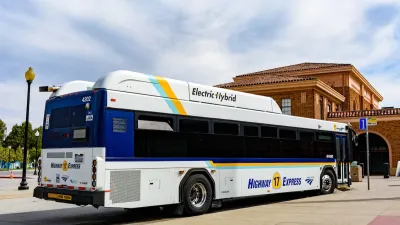'Quiet' cars on trains -- where cell phones and loud headphones are banned -- are widely popular. So why aren't more transit agencies making designated quiet cars?
"Numerous public opinion surveys find that people are irritated by being around the cell phone calls of others. Recognizing this fact, Amtrak has created a "quiet car" on their Acela Express. The car is for those passengers who refrain from using their cell phone and those who want to avoid people who cannot.
The cell phone-free train car is not a concept limited to Amtrak. The French national railway provides something called the "Zen car," which is designed to encourage serene travel. No cell phone talking allowed. Recently, Graz, Austria announced that it would be implementing a similar tranquil carriage in their city system. And the subways of Germany go even further: signage asks riders to keep their MP3 players turned down so that the music leaking from earbuds will not irritate other riders.
Given the degree of civility shown on these and many other mass-transit systems, it seems high time for the Long Island Railroad and New Jersey Transit to adopt similar arrangements so that their riders can also enjoy cell phone-free train cars."
FULL STORY: The Power of Quiet

Americans May Be Stuck — But Why?
Americans are moving a lot less than they once did, and that is a problem. While Yoni Applebaum, in his highly-publicized article Stuck, gets the reasons badly wrong, it's still important to ask: why are we moving so much less than before?

Using Old Oil and Gas Wells for Green Energy Storage
Penn State researchers have found that repurposing abandoned oil and gas wells for geothermal-assisted compressed-air energy storage can boost efficiency, reduce environmental risks, and support clean energy and job transitions.

Placekeeping: Setting a New Precedent for City Planners
How a preservation-based approach to redevelopment and urban design can prevent displacement and honor legacy communities.

Study: Maui’s Plan to Convert Vacation Rentals to Long-Term Housing Could Cause Nearly $1 Billion Economic Loss
The plan would reduce visitor accommodation by 25,% resulting in 1,900 jobs lost.

Idaho Data: Unexpected Vehicle Repairs Exacerbate Housing Instability, Eviction Risk
Over 21 percent of clients struggle with transportation barriers.

A Year-Long Investigation On Permanent Supportive Housing
The New York Times reveals what’s working and what’s not in the cornerstone of Housing First.
Urban Design for Planners 1: Software Tools
This six-course series explores essential urban design concepts using open source software and equips planners with the tools they need to participate fully in the urban design process.
Planning for Universal Design
Learn the tools for implementing Universal Design in planning regulations.
Heyer Gruel & Associates PA
City of Moreno Valley
Institute for Housing and Urban Development Studies (IHS)
City of Grandview
Harvard GSD Executive Education
Salt Lake City
NYU Wagner Graduate School of Public Service
City of Cambridge, Maryland





























